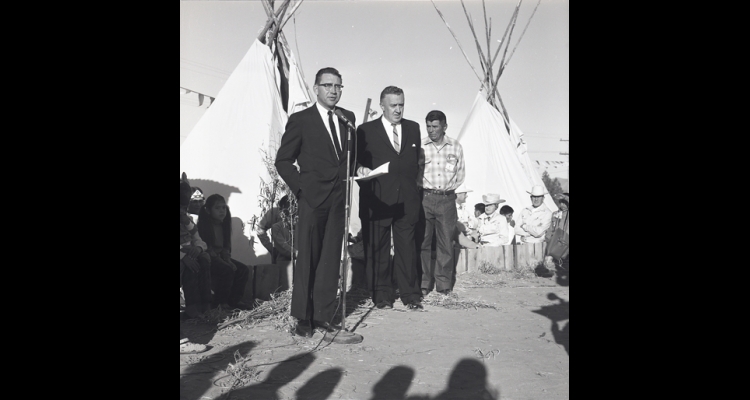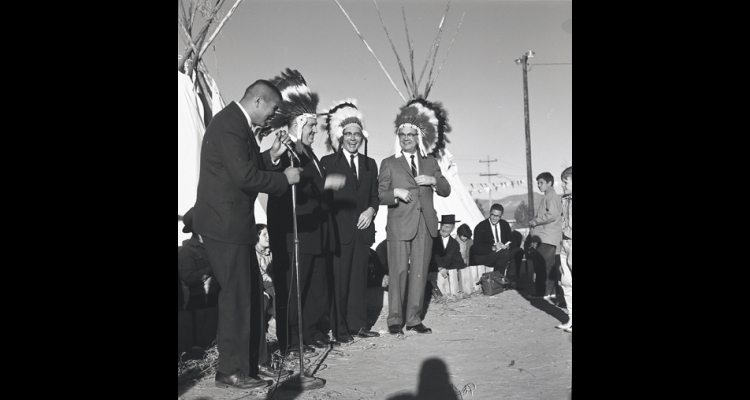Walter Baring
Born in Goldfield, Nevada on September 9, 1911, Walter Baring Jr. came by politics naturally. During Goldfield's heyday, his father was an Esmeralda County commissioner and an assemblyman. The family later moved to Reno, where the elder Walter owned a furniture store.
The younger Walter graduated from Reno High School in 1929 and the University of Nevada in 1934. Within two years after graduating college he was chairing the Washoe County Democratic Party and, like his father, was elected to the Assembly. He served two years as a deputy constable, then lost an election for constable by a wide margin.
Baring also worked for the Internal Revenue Service during his legislative service, but on July 23, 1937, local Internal Revenue collector R. L. Douglass suspended him, purportedly for being involved in politics while a federal worker. In his biography of U.S. Senator Pat McCarran, Jerome Edwards suggests the suspension occurred because Baring had run afoul of McCarran.
Baring resigned from the Assembly during his second term to enter the navy. After serving in World War II from 1942 to 1945, Baring returned to Reno and was elected to the city council in 1947. Then he won a seat in the U.S. House of Representatives in 1948 over Republican Charles Russell. (Throughout Baring's career, Nevada had only a single U.S. House member, meaning candidates for the seat ran statewide.)
At the time, Baring was a traditional Democrat, and was even endorsed heartily by President Truman in the 1950 election. Baring won reelection easily, but the Eisenhower tide in 1952 stopped his bid for a third term. Cliff Young, an appealing young Republican, defeated him.
Baring ran again in 1954, and again he lost to Young. In that campaign he was red-baited, with Young spokesperson Les Gray likening Baring's voting record on labor issues to that of Representative Vito Marcantonio of New York (whom critics accused of communist sympathies).
When Young tried for the Senate in 1956, Baring ran for the House again. He beat Howard Cannon and three other Democrats in the primary and Republican Richard Horton in the general election.
On January 3, 1957, House Speaker Sam Rayburn welcomed "our very good friend" back to Washington. (He did not return as a first-termer. The House formula for seniority credits members for earlier terms.) Baring returned to his role as a traditional Democrat. In 1957 he and Senator John Kennedy of Massachusetts co-sponsored legislation to protect the blind, and in 1959 Baring introduced the first bill to protect wild horses.
An unprepossessing speaker, Baring was never a leader or even particularly prominent in Congress, and he left no appreciable legislative legacy. However, he was one of the state's principal political figures for many years and his later career reflected the strains in the Democratic Party in the 1960s.
In the early '60s, Baring suddenly shifted from liberal to conservative. Why, however, is unclear, although he may have thought Nevada too conservative for Kennedy's "New Frontier." In 1962, the Nevada Democratic Party made a major blunder, withholding a normally automatic ceremonial resolution praising him without having a candidate to oppose him in the party primary election. Thus, after the party cast him as a victim of its leaders and he was reelected over their opposition, it made him appear to be a giant killer. His new appeal to GOP voters meant he could lose only by campaigning, so Baring laid low throughout the campaign.
His legislative interests changed. He sponsored bills like House Resolution 514: "Creating a select committee to conduct an investigation and study of the problems involved in the fluoridation of potable water." At the time, fluoridation was under heavy criticism from fringe groups like the John Birch Society. He also opposed Kennedy's New Frontier and, later, Lyndon Johnson's Great Society.
In effect, Baring rejected successive portions of the Democratic base. He called himself a "Jeffersonian state's rights constitutional Democrat." Each modifier served to peel away a portion of Baring's party support, none more so than the term "state's rights," which, in the 1960s, was a code word for opposition to civil rights.
After his rebirth as a conservative, Baring was unbeatable in general elections because he pulled a heavy Republican vote, which, when melded with conservative Democrats, gave him easy wins. But he had close calls in Democratic primary elections. In 1964 and 1966, Ralph Denton of Boulder City pressed him hard in rough primaries.
Along with his new conservatism, Baring exhibited a new vindictiveness. After winning his second race against Denton, he demanded that University of Nevada President Charles Armstrong take action against professors being involved in politics, which Baring claimed violated the federal Hatch Act. (Armstrong said most of the professors Baring named merely signed a newspaper advertisement endorsing Denton without using their university affiliation; one of them, political scientist Don Driggs, had simply provided political analysis to the Reno Evening Gazette, and in any event Nevada's attorney general advised him that professors were not covered by Hatch).
Aside from Baring's electoral difficulties, his role as a Democratic right-winger had hurt his state and his congressional standing. In 1965, after the long-sought Southern Nevada Water Project finally passed Congress and landed on President Lyndon Johnson's desk, the president waited a while to sign it, in an attempt to punish Baring before finally approving it.
Years passed during which another House member with Baring's tenure might have moved on to more significant committees, but he never did. Carl Albert, later House Speaker, described the way Baring lost a coveted seat on the influential Ways and Means Committee:
"You had two candidates, Walter Baring of Nevada and Judy [Julia Butler] Hansen of Washington. They both wanted it. Baring was a man you couldn't have. The administration didn't trust him. The party couldn't trust him. He was an enemy of foreign aid and other things. I don't know all the strings that were pulled to make sure the Ways and Means Committee didn't elect him; but I'm certain that outside forces were at work. The job was given to Mrs. Hansen."
Meanwhile, Baring moved further right. The term "communist" tended to lose its meaning when Baring employed it; he often used it against people and institutions he opposed, including the United Nations. He denounced civil rights as communist inspired, adding, "It's been shown that Martin Luther King is connected with several subversive groups, and yet he calls himself a reverend." In 1967, during a House debate on flag "desecration," Baring referred to "dirty, long-haired, communist-led beatniks."
Sometimes Baring's positions aligned him with others whom he otherwise had nothing in common with, as when, in November 1971, he abandoned his long support for the war in Vietnam and voted to cut off spending for it. He reasoned that the U.S. was not fighting the war aggressively enough to win and should get out. It was the opposite view of war critics, but they were happy for votes against the war wherever they found them.
In 1970, the Nevada Republican Party declined to support any candidate against Baring, and the party's share of the vote against Baring fell to 17.5 percent. Why Baring never switched to the Republican Party is something of a mystery, since it might have made him invulnerable.
Just two years after that smashing general election victory in 1970, Baring's luck ran out and he lost the Democratic primary, 52.21 to 45.60 percent, to University of Nevada Regent James Bilbray. Bilbray was now known as "the giant killer," though he scarcely had time to savor the role. Baring spitefully endorsed little-known Gardnerville Republican Realtor David Towell, who defeated Bilbray in the general election.
Baring's long political career was over after ten nonconsecutive terms in the House. He discussed running for governor in 1974 but would have faced another conservative Democrat, incumbent Mike O'Callaghan, though O'Callaghan's conservatism was hardly the hard-right brand Baring espoused. Baring passed up the race and died on July 13, 1975.
Article Locations
Related Articles
None at this time.

